Schlagwort: ‘RWTH’
Student of the year 2024: Contimi Kenfack Mouafo
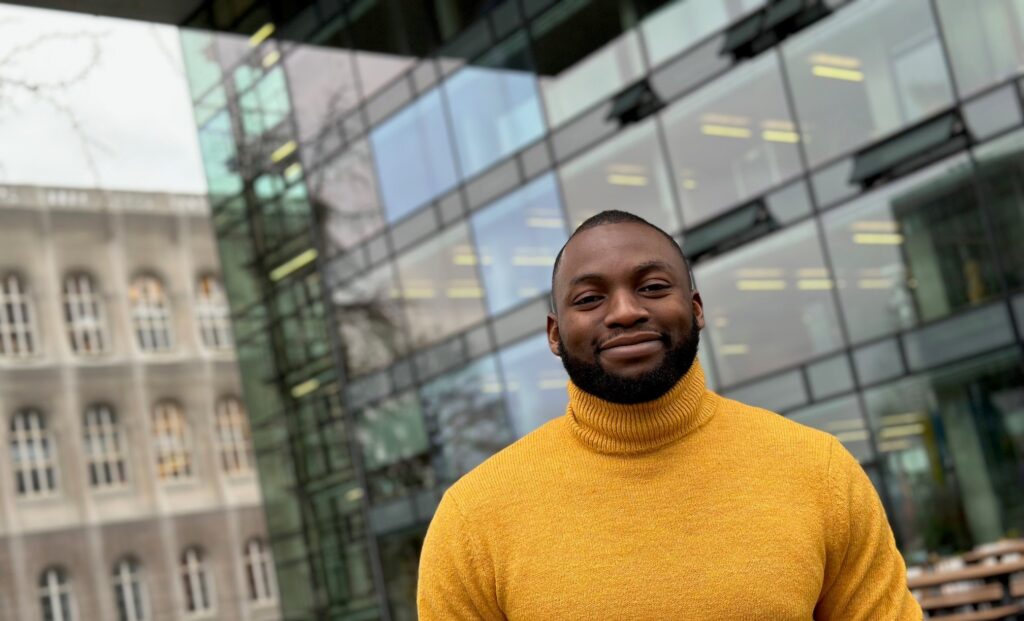
Contimi Kenfack Mouafo is Student of the Year 2024. © Thorsten Karbach
The German University Association has awarded the title of ‘Student of the Year 2024’ to an outstanding young man who is studying Electrical Engineering and Information Technology at RWTH and is involved with the ‘3 E’s 4 Africa’ association. Congratulations to him!
Contimi Kenfack Mouafo is a passionate advocate for the potential of young people in Africa. He campaigns against climate change with innovative projects and aims to correct the negative image of his home continent.
“We must show that African countries are different from the negative stereotypical images that are constantly conveyed.”, says Contimi Kenfack Mouafo.
The association ‘3 E’s 4 Africa’ promotes projects that focus on sustainable fertiliser production from green hydrogen in Namibia and more efficient biogas plants for small farmers in Ghana. The organisation’s name stands for Education, Empowerment and Ecofriendliness.
At the age of 19, the student came to Germany to study and became active in Engineers Without Borders. Later, he founded the ‘3 E’s 4 Africa’ association, where he has been the Chairman of the Board ever since. The association aims to support African students who are working on local education and research projects related to energy transition, combating climate change, and climate change adaptation. German students also contribute to this objective.
The organisation promotes research projects that are environmentally friendly and tackle local challenges while developing African solutions. They network those involved and support independent action by African partners. Additionally, the organisation contributes to the integration of international students at German universities.
Mr Kenfack Mouafo will be honoured as ‘Student of the Year 2024’ at the ‘Gala of German Science’ in Berlin on 25 March for his inspiring commitment. The German Student Union (DSW) and the German University Association (DHV) will present him with the award, which is endowed with 5,000 euros. The Faculty of Electrical Engineering and Information Technology congratulates Mr Kenfack Mouafo on his achievement and wishes him all the best for the future!
Information about the association “3 E’s 4 Africa e. V.” can be found here.
Delegation visits IIT Madras
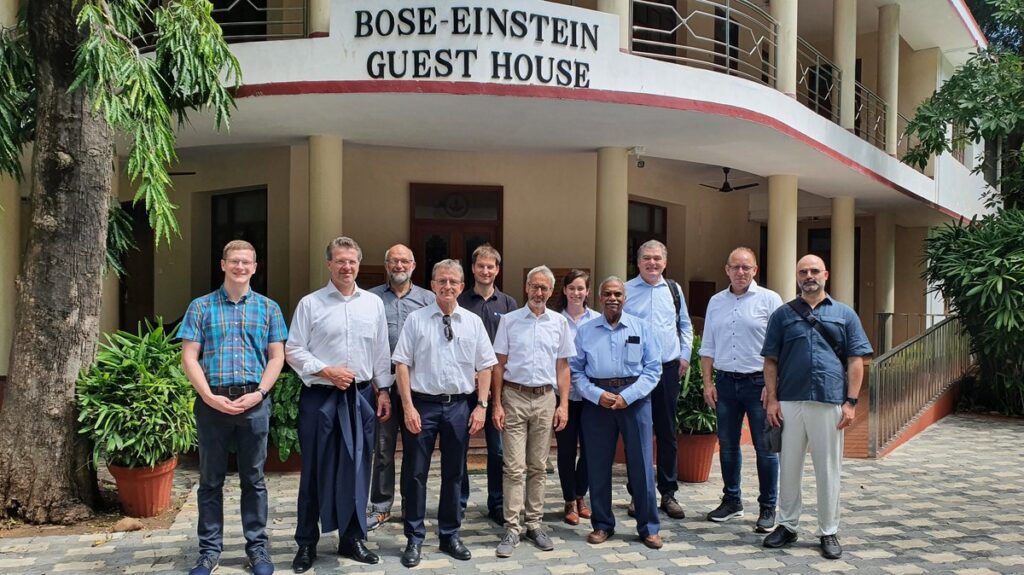
Professor Leonhardt and colleagues © MedIT
The Institute of Medical Information Technology (MedIT) on the road in Chennai, India.
Professor Leonhardt and his colleagues from MedIT and other RWTH institutes visited India in late September, specifically the Indian Institute of Technology (IIT) Madras in Chennai. The aim of this visit was to finalise the proposal for an Indo-German Graduate College.
IIT Madras is a premier university for engineering sciences in India, established in 1959 with assistance from the former West German government. The plans for this were arranged in 1956 during a meeting between Jawaharlal Nehru and Konrad Adenauer. The IIT Madras campus spans 2.5 sq km and has a dense forest. Previously, it belonged to the Guindy National Park. Conservation measures are in place for the campus where most students and staff also reside. A variety of wildlife, such as deer, antelope, axi deer, monkeys, snakes, and scorpions, can be found inhabiting the area.
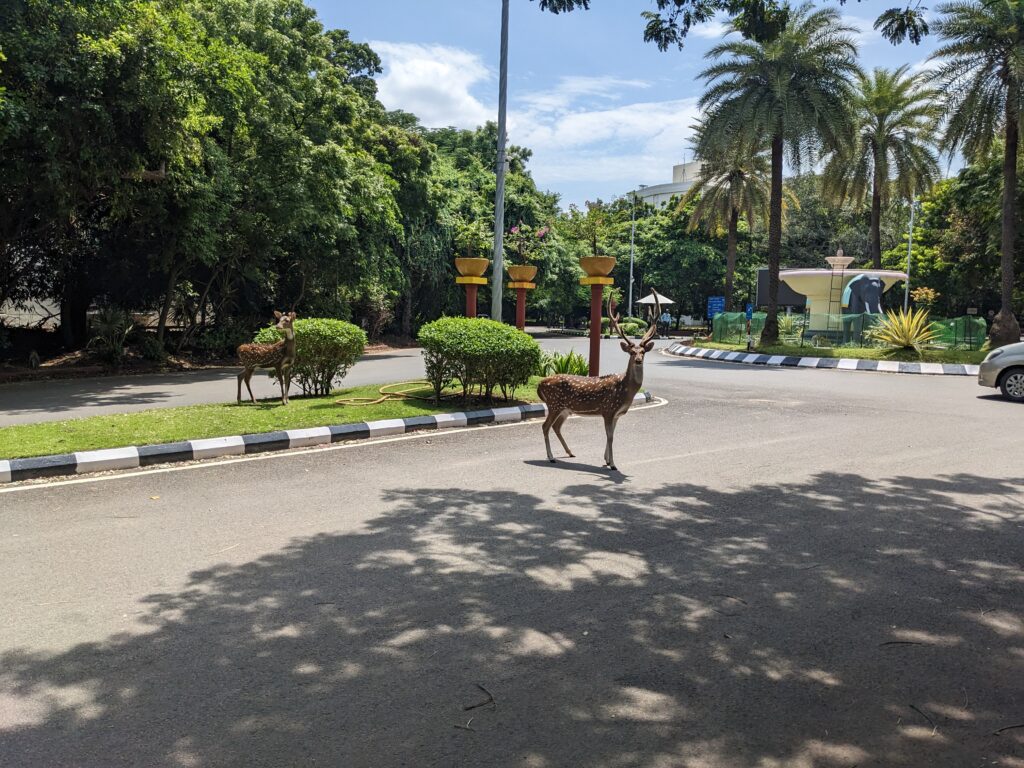
© MedIT
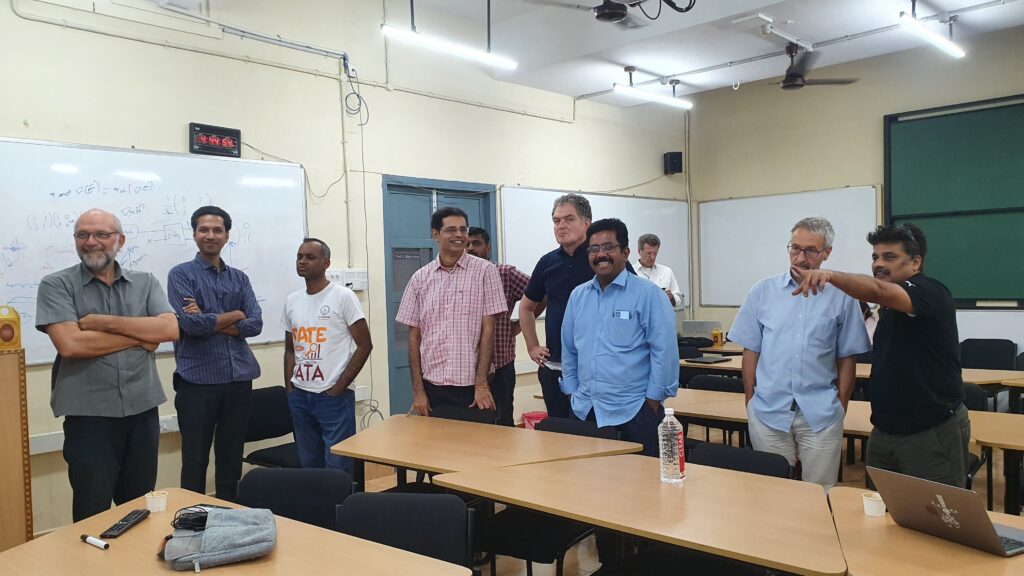
© MedIT
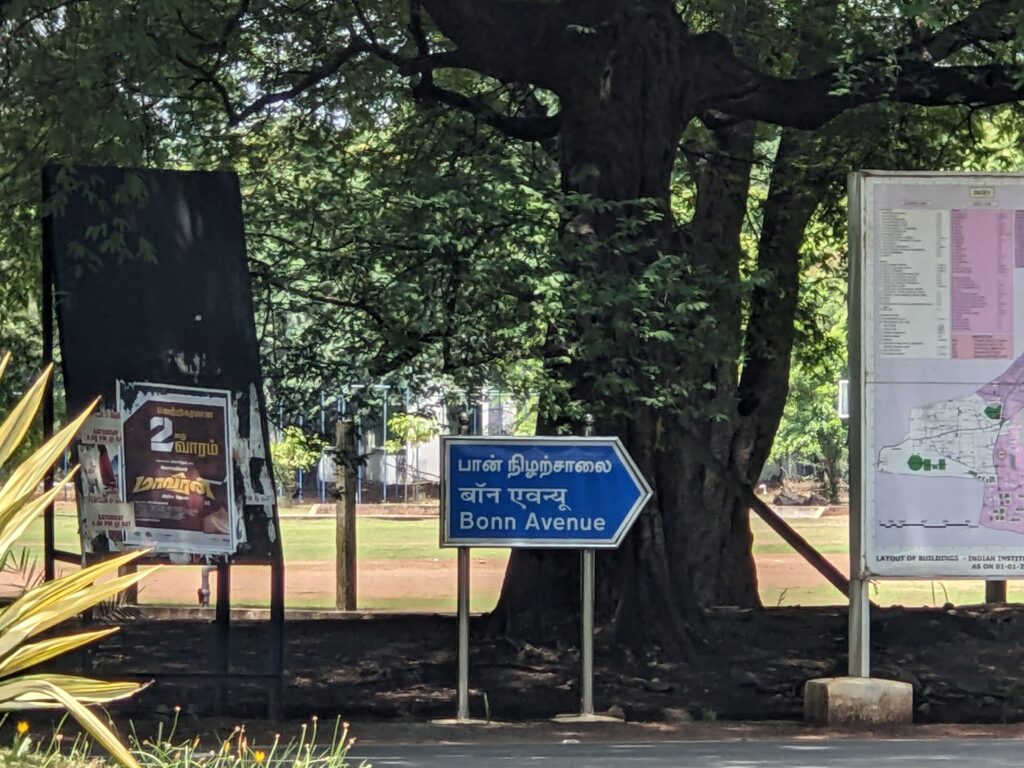
© MedIT
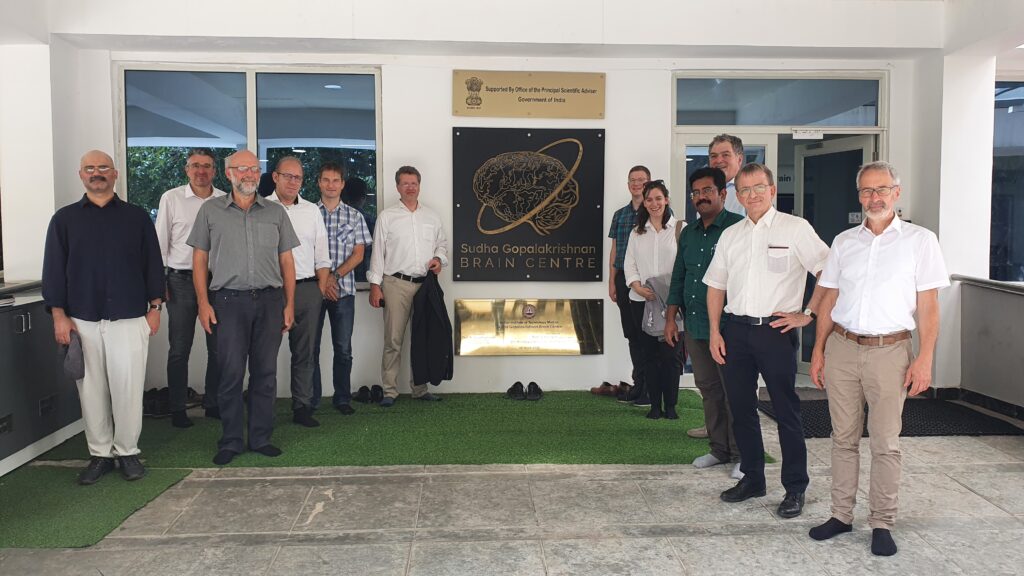
© MedIT
For more news, visit the MedIT website.
MedIT looks back on 20 years of history

Happy Birthday!
Since the founding of the Chair of Medical Information Technology (formerly the Philips Chair of Medical Information Technology) on 01.08.2003, a lot has happened: new research areas have been opened up, international collaborations have been established, a branch office has been opened and many young PhD students have graduated here.
MedIT is grateful and proud of this development and would like to share it with old and new colleagues, partners and friends.
To mark this occasion, an anniversary celebration will take place in September 2023, which will also include a symposium in which MedIT would like to discuss the past and future of the chair as well as medical technology in Aachen and the world.
Further information on the lecture programme: Das MedIT feiert sein 20-jähriges Bestehen (rwth-aachen.de) (only in german)
New Perspectives for Communication Technology: A German-Japanese Partnership
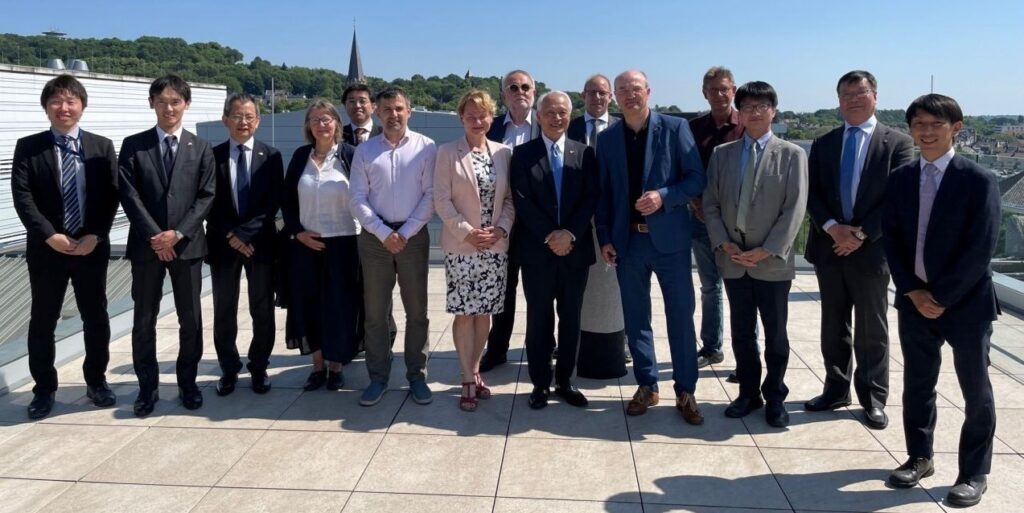
A delegation from the National Institute of Information and Communication Technology (NICT) in Japan visited RWTH Aachen University for the signing of a Memorandum of Understanding. © RWTH Aachen University
RWTH University has started an exciting cooperation in the field of 5G/6G mobile communications technology with the National Institute of Information and Communication Technology (NICT) in Japan. This was sealed by a memorandum of understanding that Professor Ulrich Rüdiger and Professor Hideyuki Tokuda, President of NICT, signed together in June. They received a delegation from NICT at RWTH Aachen University.
The Memorandum of Understanding is intended to strengthen and expand academic cooperation between both partner institutions. This includes the exchange of scientists and students, collaborative research projects, publications and the transfer of knowledge on 5G/6G mobile communications technology.
The cooperation was initiated as part of the BMBF-funded research programme “6GEM Research Hub”, which is coordinated by Professor Haris Gačanin from the Chair of Distributed Signal Processing at RWTH. In this project, RWTH Aachen University, Ruhr University Bochum, Dortmund University of Technology and the University of Duisburg-Essen, as well as the Fraunhofer Institute for Material Flow and Logistics, the Fraunhofer Institute for Microelectronic Circuits and Systems, the Fraunhofer Institute for High Frequency Physics and Radar Techniques and the Max Planck Institute for Security and Privacy are researching future communication technologies in 6G mobile communications technology.
Source: RWTH press release: Research Partnership With NICT in Japan – RWTH AACHEN UNIVERSITY – English (rwth-aachen.de)
Energy Park Herzogenrath: Chair of Electrochemical Energy Conversion and Storage Systems is involved in research
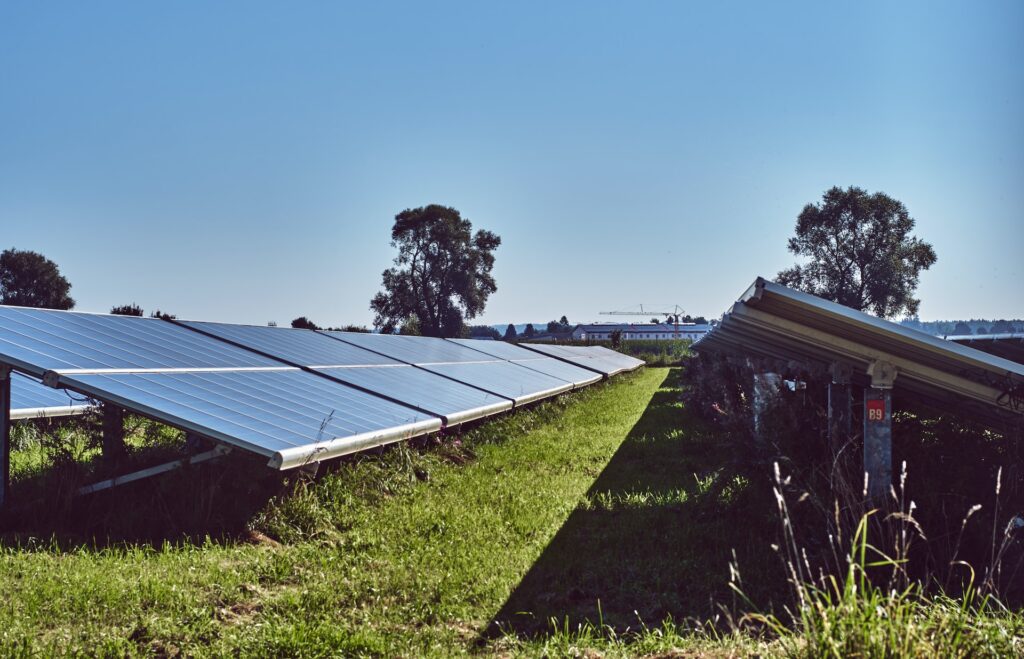
© Michael Förtsch by Unsplash
The project for CO2-neutral energy supply in Herzogenrath, the first city in NRW to strive for this goal, is accompanied by a consortium of four chairs and institutes, including the Chair of Electrochemical Energy Conversion and Storage Systems Technology.
Herzogenrath wants to achieve CO2-neutral energy supply by 2030. A consortium of Siemens Energy, RWTH Aachen University, Aachen University of Applied Sciences and the Niederrhein University of Applied Sciences is conducting research on the project “Energy Park Herzogenrath Research & Development”, which is funded by the Federal Ministry of Economics and Climate Protection with 2.7 million euros. The project is also closely interlinked with other ongoing research and funding projects: at the local flat glass manufacturer Saint Gobain, CO2-free production is being researched, in which the Chair of Electrochemical Energy Conversion and Storage Systems Technology at the E.ON Energy Research Center (ERC) of RWTH Aachen University is involved. The aim is to recycle the heat generated during glass production in Herzogenrath and Kerkrade in the Netherlands as green heating energy.
The project uses a digital twin that virtually maps and simulates the energy supply. In this way, different scenarios can be tested and optimised. The project looks at generation, consumption and marketing options across sectors. RWTH is receiving around 918,000 euros in funding for this.
More information on the project can be found at Energiepark Herzogenrath – Strukturwandel Rheinisches Revier (revier-gestalten.nrw) and at CO2-neutral bis 2030: Forschungsprojekt Energiepark Herzogenrath mit rund 2,7 Millionen Euro gefördert | Wirtschaft NRW.
Climate protection through electrical engineering – Professor Dirk Uwe Sauer’s lecture at the Children’s University
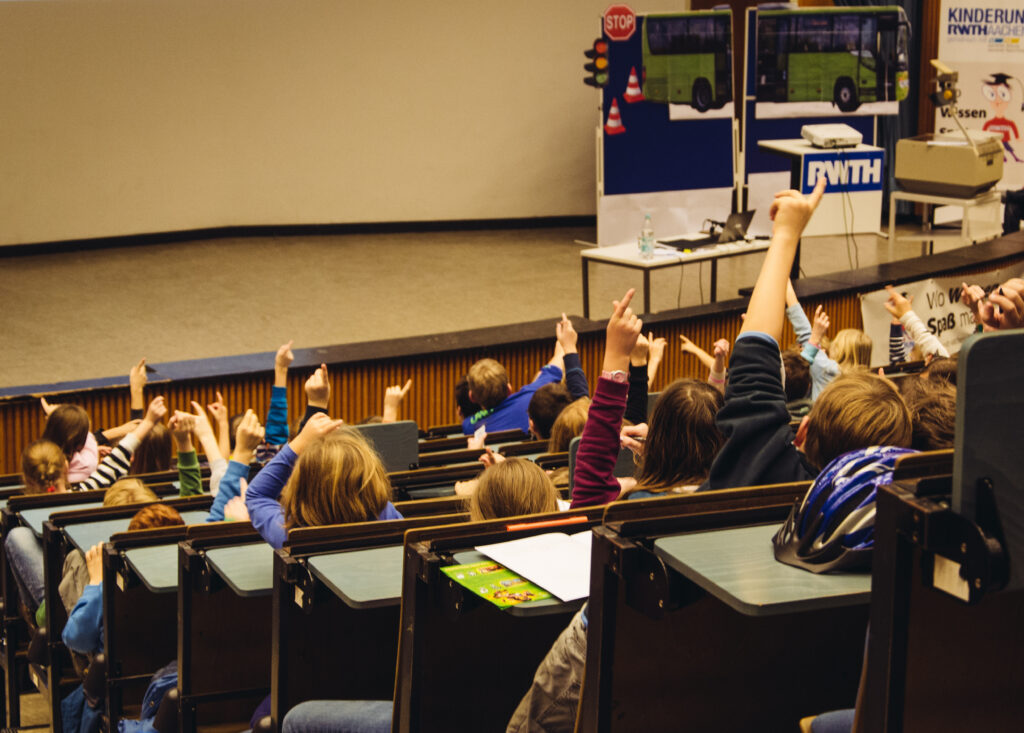
Kinder im Hörsaal. ©RWTH Aachen University
Whether drought, floods or forest fires – the consequences of global warming are dramatic for nature and people. The countries of the global south are being hit particularly hard, but the effects are also being felt here. We experienced this at the latest with the devastating floods in July 2021. That is why we urgently need to address the issue of climate change.
This is also what Dirk Uwe Sauer, Professor of Electrochemical Energy Conversion and Storage Systems Technology at RWTH Aachen University, is doing. He has been researching new energy systems for over 30 years and advises politicians on the energy transition.
„We see in all places that climate change is happening – with many negative consequences. And we urgently need a radical change in the way we have supplied ourselves with energy so far.“
This does not only affect us adults, but especially the children and young people of today. They will have to live with the limitations that climate change will bring. “I don’t think we should underestimate what children know and what they are capable of,” says Professor Sauer.
It is not too late to make a difference
In his lecture, the physicist not only explained the dangers of climate change, but also made the necessary changes understandable. He used various materials such as videos, slides and interactive presentations to show the physical basics and the possibilities through timely action: “I also want to spread optimism and show that things can also get better than they currently are. Because if we still grab the wheel in time, then we still have the possibility to avoid worse things.” For this to happen, however, society must overcome its fear of new technologies. The professor said that there is too much talk about the risks instead of seeing the opportunities. “And we simply can’t afford that now either.” A ruling by the Federal Constitutional Court in 2021 has obliged politicians, and thus the population, to act more quickly. The slower progress is made, the more the living conditions of the next generations are restricted. That is why the previous federal government tightened the climate protection targets and the Climate Protection Act. “We have the opportunity to achieve these goals. We have the necessary technologies to supply all eight billion people in the world properly with renewable energy,” Sauer said.
Climate change is an important issue that concerns us all. But what does it actually mean and how can we work against it? Professor Sauer explained this to the children in his lecture at the Children’s University on 16 June 2023. He showed them how the earth is warming up and what consequences this has for nature and people. He also presented solutions on how we can protect the climate with renewable energies and new technologies. For example, with solar cells that generate electricity from sunlight, or with electric cars that emit no exhaust gases. Professor Sauer showed the children not only the problems of climate change, but also the opportunities that arise from it. He showed them that we can not only influence the climate with our energy supply, but also promote biodiversity.
„I would like to show the children that, for example, large photovoltaic systems on open fields not only generate electricity, but also create space for extensive agriculture, for insects that can live and flourish in these areas again.“
Climate change is a major challenge that we can only overcome together. For this, we need an awareness of the connections between energy and the environment that starts with children. Another goal of the Children’s University event was to get the children excited about scientific topics. “Physics has the great advantage that it can illustrate things very vividly and also show connections,” said Sauer. Using simple means, Professor Sauer showed where research starts and what possibilities can arise through technical progress.
Source: Aachener Zeitung, 16 June 2023
Encouraging women to take up MINT professions – support for ZDF heute journal
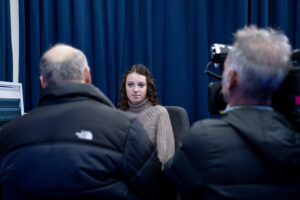
BA student Helena in an interview with the ZDF heute journal team. Photo: C. Antweiler
At the end of January, the team from ZDF heute journal visited the Institute for Communication Systems at RWTH Aachen University for a report. The report provides insights into the topic of “women in MINT subjects”, which are sometimes chosen even less by women and girls, such as mathematics, computer science, natural science and technology. Editor Peter Böhmer from the North Rhine-Westphalia State Studio researched the reasons for the low quota of women at RWTH Aachen University and what approaches could be taken to change this.
Through interviews with various female RWTH students, including our BA student Helena, as well as with Univ. Prof. Dr. rer. nat. Aloys Krieg, Prorector for Teaching, the heute journal team was able to gain an impression. The Institute for Communication Systems and a lecture by Prof. Peter Jax provided the pictorial framework for the report.
You can find the report in the ZDF Mediathek.
Review of the 150th anniversary exhibition of the RWTH
From October 30, 2021 to February 13, 2022, the 150th anniversary exhibition of the RWTH took place at the Centre de Charlemagne in Aachen. ISEA – the Institute for Power Electronics and Electrical Drives – also contributed with some exhibits to illustrate the highlights from research and the development of RWTH since its foundation in October 1870.
For all those who could not be there and see this wonderful exhibition for themselves, we have a short review.
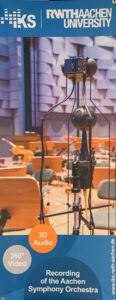
Among others, the IKS was also involved. The project “Virtual visit” dealt with the 3D telephony of the future: Who hasn’t had the wish to beam to the other side while talking on the phone? At least via audio, this would be possible in the future; for example, one could already sit virtually in the middle of a concert of the Aachen Symphony Orchestra.
Prof. Dr. Peter Jax presented the state of the art as well as current research topics in his lecture and invited to an exciting discussion afterwards.
It was very interesting to get to know a current research project of the IKS and to experience the research live.
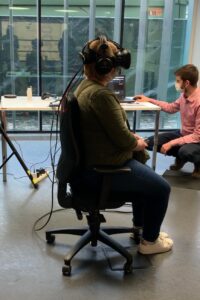
The content of the lecture was further illustrated in the exhibition by virtually sitting in the middle of the concert of the Aachen Symphony Orchestra. The aim was to perceive the sound in 3 dimensions. To experience this phenomenon, all one had to do was put on a pair of virtual reality glasses and enjoy the sounds of the Aachen Symphony Orchestra.
It was particularly fascinating to be able to hear the sounds from all directions and at the same time to be able to identify the direction from which they came. It was easy to follow the sounds more closely by turning around to look at them with the glasses. It was really a great insight into the research of the IKS.



